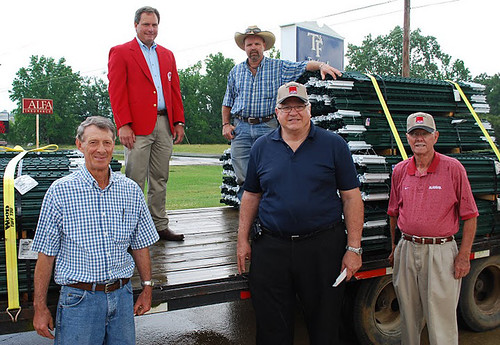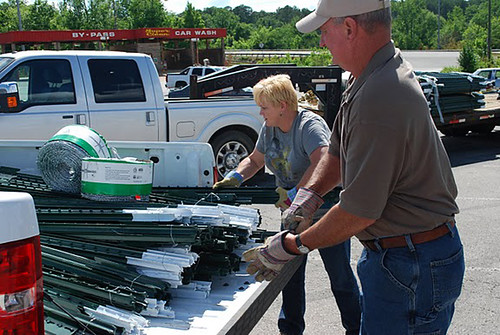
When tornadoes struck Alabama in April 2011, people across the state rushed to help their neighbors with food, shelter and basic necessities. But volunteers didn’t have much time to help cattlemen round up and secure livestock.
Cattle fencing in Marion, Lawrence and Franklin Counties had sustained major damage in the storms. On many properties, stream crossings, watering facilities and livestock shade structures were in bad shape.
So when the Winston County Cattlemen’s Association, in northwest Alabama, received $12,000 from the Kentucky Cattlemen’s Association and another $4,000 from the Alabama Farmer’s Federation, its staff ordered fencing supplies and identified the producers in the area that needed help.
And when the professional organization requested assistance in distributing the 3,120 metal T-posts and 96 rolls of barbed wire they had purchased, USDA’s Natural Resources Conservation Service (NRCS), which works with farmers and ranchers to implement conservation practices on the land through voluntary programs, was a natural fit to coordinate the task.
Wade Hill, NRCS District Conservationist in Winston/Marion Counties, worked out the delivery logistics. District Conservationists Kathy Gotcher, in Lawrence County, and Matt Copeland, in Franklin County, helped identify the most heavily impacted areas in the three counties.

On May 26, Wade took his personal gooseneck trailer to pick up all the posts and wire (32,000 pounds) and headed out to make deliveries. Hauling all the materials at once turned out to be a mistake. But after four tire blowouts and repairs, the group finally made it, three hours late, to their first stop in Hackleburg.
The producers did not seem to mind the delay. They were gathered with pickups and trailers to receive the materials needed to start replacing their downed fences. Hill, Gotcher and Copeland, along with Soil Conservation Technician Pam Skidmore, were on hand to help the 24 producers load enough posts and wire to build a quarter-mile of fencing to secure herds scattered by the storm. Other stops included Russellville and Moulton.
Even though the producers did not obtain enough to repair all of their fencing, they were very grateful for what they did receive. Many of them had experienced severe despair and destruction, and some had lost everything to the storms. NRCS personnel and others felt that in addition to the fencing supplies, maybe they also passed around a little hope that day.
NRCS emergency funds have since been made available to farmers and ranchers through the Environmental Quality Incentives Program, but this first response effort, facilitated by NRCS Alabama staff, made a difference.
